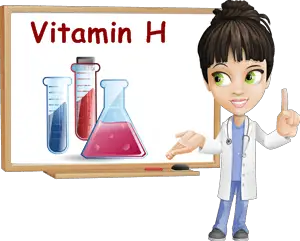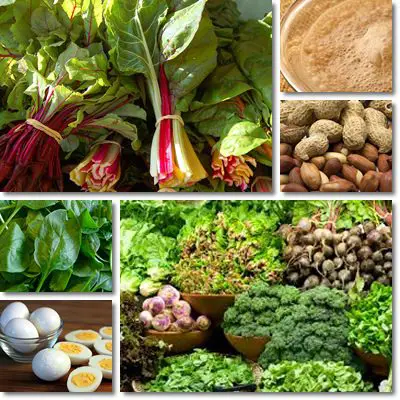Biotin, vitamin B7, vitamin B8 and vitamin H all refer to a water-soluble vitamin of the B group. Vitamin H promotes normal growth and development and helps maintain a good overall health. It is necessary for the metabolism of carbohydrates, proteins and fats, resulting in energy production. Also, it aids in the formation of fatty acids and supports cell growth. Other noteworthy pharmacological effects of biotin include better diabetes management and prevention, lower blood lipid content and metabolism regulation.
It’s never a matter of which vitamin is the most important; all vitamins contribute to our general well-being and both physical and mental health. A good diet, varied and balanced, should provide most, if not all of the nutrients our body requires in order to stay healthy and fit. The rest can be covered by supplements. Even a simple vitamin such as biotin or vitamin H can make a huge difference in terms of health benefits.

For instance, vitamin H helps treat alopecia (or hair loss) and premature graying in individuals with extremely low biotin levels. If you have a biotin deficit and are also dealing with severe hair loss, you could get great results by simply meeting your daily vitamin H requirements. It is also great against sore muscles and anemia. An adequate intake promotes brain health and has been shown to prevent neurological problems such as hallucinations and tingling sensations in the extremities.
Even more, it supports fats and amino acids synthesis, contributing to a healthy-looking skin. Despite the misconception that eating fats makes you gain weight, fats are actually an essential nutrient. For example, they are important to cell membranes which regulate permeability allowing various nutrients to enter the cell and elements that need to get out, leave the cell. Skin cells in particular require a continual exchange with the outside, especially allow water and nutrients to enter the cell. And by helping synthesize fats, vitamin H (biotin) not only allows water to enter cells and contribute to hydrated skin, but also various other essential vitamins and minerals with antioxidant effects, contributing to anti-aging benefits.
Moreover, vitamin H is involved in the synthesis of amino acids, the elements that make up protein. Amino acids are required for strong, healthy hair and help synthesize neurotransmitters in the brain that regulate appetite and mood, providing benefits such as improved mood, clearer thinking and increased productivity. And vitamin H plays a role in achieving all of these benefits.

According to The Journal of Nutritional Biochemistry, biotin supplementation can help lower blood lipid levels and contribute to better diabetes management via its effects on insulin production and pancreatic enzymes. Supplementation with biotin appears to encourage lower blood sugar levels and blood cholesterol levels, recommending the vitamin for both hyperglycemia and diabetes and hyperlipidemia (Pharmacological effects of biotin, July 2005).
Vitamin H (biotin) food sources
Considering the wide availability of most foods nowadays, it is highly unlikely for biotin deficiency to occur in a healthy, well-nourished individual. A balanced, varied diet with biotin-rich foods should easily meet one’s daily requirements. The best sources of the vitamin include liver (beef, pork, turkey, chicken), eggs (chicken, duck, goose, turkey, quail, ostrich and more), nuts and seeds such as peanuts and sunflower seeds and fish such as salmon.
Vitamin H (biotin) deficiency symptoms
However, bad lifestyle habits and poor dietary choices may prevent a proper vitamin H intake. For example, people who want to increase their muscle mass are often advised to eat raw egg whites. However, raw egg whited contain a special protein (avidin) which binds with biotin. Eating raw egg whites for prolonged periods of time will lead to severe biotin deficiency.
Cooking egg whites will counteract the negative effects of avidin and allow for proper absorption of the vitamin. Another benefit of avoiding raw or undercooked eggs is you don’t risk foodborne illness from possible Salmonella infections. Also, prolonged use of antibiotics can stop biotin production in the gastrointestinal tract.
Biotin deficiency can cause very unpleasant health problems and may lead to more serious neurological problems. Alopecia (partial or total loss of hair), seborrheic dermatitis, anemia, muscle aches, nausea, fatigue, loss of appetite, conjunctivitis, even depression episodes, hallucinations and numbness and tingling in hands and feet are all symptoms of vitamin H deficiency.
What are the benefits of biotin?
Biotin is of crucial importance to our good health and these are 10 of its most noteworthy benefits to prove it:
- Necessary for cell growth and fatty acids production.
- Takes part in energy production by contributing to the synthesis of fats, protein and carbohydrates.
- Plays a key role in the Krebs cycle (the process of energy release from food).
- Holds benefits for skin health and actively advances skin health.
- Anti-aging benefits: biotin helps prevent premature hair graying.
- Benefits for hair: biotin helps prevent and combat hair loss.
- Benefits for muscles: biotin helps alleviate muscle pain.
- Promotes the health of sweat glands, nerve tissue and bone marrow.
- Supports carbon dioxide transfer at cell level.
- Maintains blood sugar levels regular.
All in all, vitamin H (biotin) is extremely important for good health, considering it provides so many health benefits. Daily requirements can easily be met through a balanced diet containing biotin-rich foods such as yeast, eggs, fish such as salmon, tuna, cod and mackerel, nuts such as peanuts and lots of healthy leafy green vegetables such as spinach.
